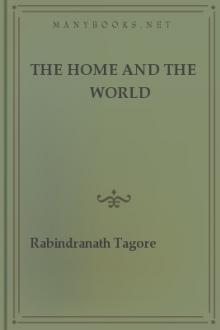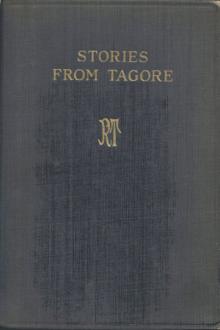The Home and the World - Rabindranath Tagore (books to read in your 30s .txt) 📗

- Author: Rabindranath Tagore
- Performer: -
Book online «The Home and the World - Rabindranath Tagore (books to read in your 30s .txt) 📗». Author Rabindranath Tagore
back in a few days. I thought he might have sallied forth to
hunt for witnesses in Panchu's uncle's village. In that case,
however, I was sure that his would be a hopeless quest ...
During the day I forget myself in my work. As the late autumn
afternoon wears on, the colours of the sky become turbid, and so
do the feelings of my mind. There are many in this world whose
minds dwell in brick-built houses--they can afford to ignore the
thing called the outside. But my mind lives under the trees in
the open, directly receives upon itself the messages borne by the
free winds, and responds from the bottom of its heart to all the
musical cadences of light and darkness.
While the day is bright and the world in the pursuit of its
numberless tasks crowds around, then it seems as if my life wants
nothing else. But when the colours of the sky fade away and the
blinds are drawn down over the windows of heaven, then my heart
tells me that evening falls just for the purpose of shutting out
the world, to mark the time when the darkness must be filled with
the One. This is the end to which earth, sky, and waters
conspire, and I cannot harden myself against accepting its
meaning. So when the gloaming deepens over the world, like the
gaze of the dark eyes of the beloved, then my whole being tells
me that work alone cannot be the truth of life, that work is not
the be-all and the end-all of man, for man is not simply a serf--
even though the serfdom be of the True and the Good.
Alas, Nikhil, have you for ever parted company with that self of
yours who used to be set free under the starlight, to plunge into
the infinite depths of the night's darkness after the day's work
was done? How terribly alone is he, who misses companionship in
the midst of the multitudinousness of life.
The other day, when the afternoon had reached the meeting-point
of day and night, I had no work, nor the mind for work, nor was
my master there to keep me company. With my empty, drifting
heart longing to anchor on to something, I traced my steps
towards the inner gardens. I was very fond of chrysanthemums and
had rows of them, of all varieties, banked up in pots against one
of the garden walls. When they were in flower, it looked like a
wave of green breaking into iridescent foam. It was some time
since I had been to this part of the grounds, and I was beguiled
into a cheerful expectancy at the thought of meeting my
chrysanthemums after our long separation.
As I went in, the full moon had just peeped over the wall, her
slanting rays leaving its foot in deep shadow. It seemed as if
she had come a-tiptoe from behind, and clasped the darkness over
the eyes, smiling mischievously. When I came near the bank of
chrysanthemums, I saw a figure stretched on the grass in front.
My heart gave a sudden thud. The figure also sat up with a start
at my footsteps.
What was to be done next? I was wondering whether it would do to
beat a precipitate retreat. Bimala, also, was doubtless casting
about for some way of escape. But it was as awkward to go as to
stay! Before I could make up my mind, Bimala rose, pulled the
end of her sari over her head, and walked off towards the
inner apartments.
This brief pause had been enough to make real to me the cruel
load of Bimala's misery. The plaint of my own life vanished from
me in a moment. I called out: "Bimala!"
She started and stayed her steps, but did not turn back. I went
round and stood before her. Her face was in the shade, the
moonlight fell on mine. Her eyes were downcast, her hands
clenched.
"Bimala," said I, "why should I seek to keep you fast in this
closed cage of mine? Do I not know that thus you cannot but pine
and droop?"
She stood still, without raising her eyes or uttering a word.
"I know," I continued, "that if I insist on keeping you shackled
my whole life will be reduced to nothing but an iron chain. What
pleasure can that be to me?"
She was still silent.
"So," I concluded, "I tell you, truly, Bimala, you are free.
Whatever I may or may not have been to you, I refuse to be your
fetters." With which I came away towards the outer apartments.
No, no, it was not a generous impulse, nor indifference. I had
simply come to understand that never would I be free until I
could set free. To try to keep Bimala as a garland round my
neck, would have meant keeping a weight hanging over my heart.
Have I not been praying with all my strength, that if happiness
may not be mine, let it go; if grief needs must be my lot, let it
come; but let me not be kept in bondage. To clutch hold of that
which is untrue as though it were true, is only to throttle
oneself. May I be saved from such self-destruction.
When I entered my room, I found my master waiting there. My
agitated feelings were still heaving within me. "Freedom, sir,"
I began unceremoniously, without greeting or inquiry, "freedom is
the biggest thing for man. Nothing can be compared to it--
nothing at all!"
Surprised at my outburst, my master looked up at me in silence.
"One can understand nothing from books," I went on. "We read in
the scriptures that our desires are bonds, fettering us as well
as others. But such words, by themselves, are so empty. It is
only when we get to the point of letting the bird out of its cage
that we can realize how free the bird has set us. Whatever we
cage, shackles us with desire whose bonds are stronger than those
of iron chains. I tell you, sir, this is just what the world has
failed to understand. They all seek to reform something outside
themselves. But reform is wanted only in one's own desires,
nowhere else, nowhere else!"
"We think," he said, "that we are our own masters when we get in
our hands the object of our desire--but we are really our own
masters only when we are able to cast out our desires from our
minds."
"When we put all this into words, sir," I went on, "it sounds
like some bald-headed injunction, but when we realize even a
little of it we find it to be amrita--which the gods have
drunk and become immortal. We cannot see Beauty till we let go
our hold of it. It was Buddha who conquered the world, not
Alexander--this is untrue when stated in dry prose--oh when shall
we be able to sing it? When shall all these most intimate truths
of the universe overflow the pages of printed books and leap out
in a sacred stream like the Ganges from the Gangotrie?"
I was suddenly reminded of my master's absence during the last
few days and of my ignorance as to its reason. I felt somewhat
foolish as I asked him: "And where have you been all this while,
sir?"
"Staying with Panchu," he replied.
"Indeed!" I exclaimed. "Have you been there all these days?"
"Yes. I wanted to come to an understanding with the woman who
calls herself his aunt. She could hardly be induced to believe
that there could be such an odd character among the gentlefolk as
the one who sought their hospitality. When she found I really
meant to stay on, she began to feel rather ashamed of herself.
'Mother,' said I, 'you are not going to get rid of me, even if
you abuse me! And so long as I stay, Panchu stays also. For you
see, do you not, that I cannot stand by and see his motherless
little ones sent out into the streets?'
"She listened to my talks in this strain for a couple of days
without saying yes or no. This morning I found her tying up her
bundles. 'We are going back to Brindaban,' she said. 'Let us
have our expenses for the journey.' I knew she was not going to
Brindaban, and also that the cost of her journey would be
substantial. So I have come to you."
"The required cost shall be paid," I said.
"The old woman is not a bad sort," my master went on musingly.
"Panchu was not sure of her caste, and would not let her touch
the water-jar, or anything at all of his. So they were
continually bickering. When she found I had no objection to her
touch, she looked after me devotedly. She is a splendid cook!
"But all remnants of Panchu's respect for me vanished! To the
last he had thought that I was at least a simple sort of person.
But here was I, risking my caste without a qualm to win over the
old woman for my purpose. Had I tried to steal a march on her by
tutoring a witness for the trial, that would have been a
different matter. Tactics must be met by tactics. But stratagem
at the expense of orthodoxy is more than he can tolerate!
"Anyhow, I must stay on a few days at Panchu's even after the
woman leaves, for Harish Kundu may be up to any kind of devilry.
He has been telling his satellites that he was content to have
furnished Panchu with an aunt, but I have gone the length of
supplying him with a father. He would like to see, now, how many
fathers of his can save him!"
"We may or may not be able to save him," I said; "but if we
should perish in the attempt to save the country from the
thousand-and-one snares--of religion, custom and selfishness--
which these people are busy spreading, we shall at least die
happy."
Bimala's Story
XIV
Who could have thought that so much would happen in this one
life? I feel as if I have passed through a whole series of
births, time has been flying so fast, I did not feel it move at
all, till the shock came the other day.
I knew there would be words between us when I made up my mind to
ask my husband to banish foreign goods from our market. But it
was my firm belief that I had no need to meet argument by
argument, for there was magic in the very air about me. Had not
so tremendous a man as Sandip fallen helplessly at my feet, like
a wave of the mighty sea breaking on the shore? Had I called
him? No, it was the summons of that magic spell of mine. And
Amulya, poor dear boy, when he first came to me--how the current
of his life flushed with colour, like the river at dawn! Truly
have I realized how a goddess feels when she looks upon the
radiant face of her devotee.
With the confidence begotten of these proofs of my power, I was
ready to meet my husband like a lightning-charged cloud. But
what was it that happened? Never in all these nine years have I
seen such a far-away, distraught look in his eyes--like





Comments (0)